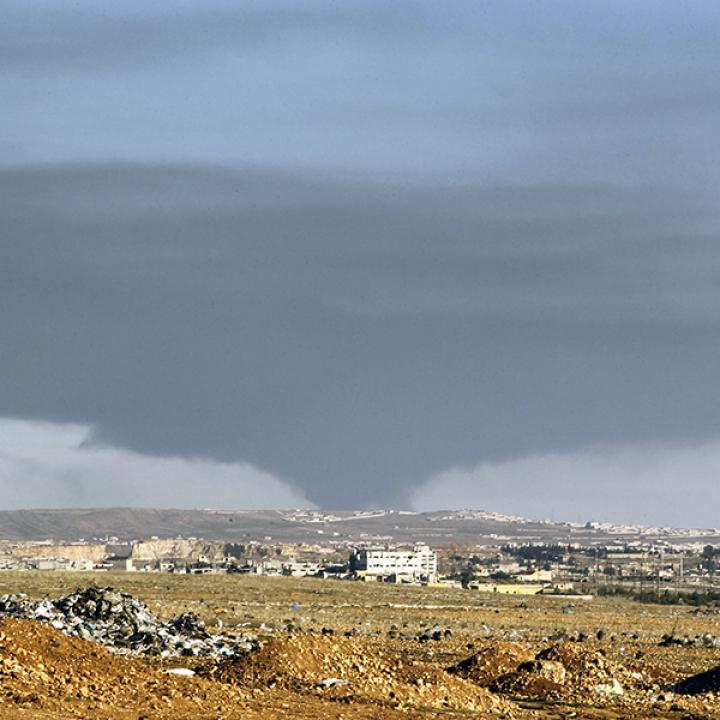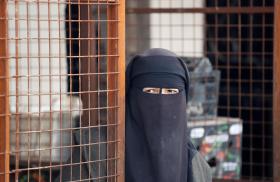
- Policy Analysis
- PolicyWatch 3340
Merging Talks on Northeast Syria with a Whole-of-Country Approach

Deeper Turkish engagement with the Syrian Kurds would be helpful, but any such talks need to be linked with ongoing efforts to contain the Islamic State and advance the UN’s broader Geneva process.
Since 2019, the United States has held several rounds of talks to ease tensions between stakeholders in northeast Syria, focusing on Kurdish-Arab and intra-Kurdish discussions toward the eventual goal of easing into Turkish-Kurdish talks. This diplomacy has made notable progress during the ongoing coronavirus-imposed ceasefire—most recently, last week’s meeting between representatives of two key Kurdish groups, the People’s Defense Units (YPG) and the Kurdistan National Council (KNC), reportedly went well. The talks followed fruitful mediation by U.S. deputy special envoy William Roebuck and Iraqi Kurdish leader Masoud Barzani, who enjoys warm relations with both the Syrian Kurds and the Turkish government.
Yet leaks regarding American efforts in this portfolio are often embarrassing for Ankara. The Kurdish dossier has long been a sensitive one for President Recep Tayyip Erdogan and large swaths of the Turkish public, so unveiling news of such talks is a delicate affair. At the same time, future negotiations will need to be more thoroughly coordinated with Turkey, publicly and privately, in order to address a series of thorny issues. These include genuinely detaching the YPG-led Syrian Democratic Forces (SDF) from Turkey’s domestic enemy, the Kurdistan Workers Party (PKK); establishing a more ethnically and religiously inclusive governance structure in northeast Syria; and decommissioning YPG heavy weapons provided by the United States, with clear agreements as to whether they can remain in use during a political transition.
Even more important, negotiations with actors in the northeast need to be conducted with an eye toward broader U.S. and Turkish interests, from delineating the Assad regime’s relationship with Syria as a whole to continuing the fight against the Islamic State (IS). Although certain aspects of Syria policy continue to divide Washington and Ankara, the two NATO allies are united in their rejection of Bashar al-Assad’s destabilizing status quo and their desire to uphold the current ceasefire in Idlib province, where the threat of another potential humanitarian disaster looms. The question is how best to address those shared interests while avoiding further Turkish military incursions and continuing to advance highly sensitive talks with Syria’s Kurds.
WHY HAS ERDOGAN STAYED OUT OF THE TALKS?
In Turkey’s eyes, any engagement with the YPG is necessarily connected to the state’s decades-long conflict with the PKK. From late 2012 to 2015, the Turkish government conducted peace talks domestically with the PKK, which remains a designated terrorist organization under U.S. law. The resultant ceasefire broke down in summer 2015 for multiple reasons: renewed PKK attacks; a lack of Kurdish support for Erdogan’s plan to constitutionally transform Turkey from a parliamentary system to a presidential one; and the fact that the YPG—the PKK’s armed Syrian affiliate—was gaining the upper hand militarily in the fight against IS in Syria.
Indeed, when the YPG became the main local partner for the international coalition against IS that year, it triggered Erdogan’s fears of a PKK-led Kurdish autonomous region forming just across Turkey’s southern border. The resultant tension strained the U.S.-Turkey relationship—though as time went on, Washington itself became internally divided on whether to regard the YPG as a terrorist affiliate (e.g., the Defense Intelligence Agency and CENTCOM came to their own conclusions on that matter).
WILL TURKEY’S MILITARY PAUSE LAST?
Although these political factors have played a role in Ankara’s hesitation to join the latest YPG talks, the deciding factor may be military in nature. Two Turkish cross-border campaigns—Operation Olive Branch in the northwestern Afrin region in January 2018, and Operation Peace Spring in the northeast last October—prevented the YPG from controlling a large, contiguous, state-like stretch of land along the entire border. Now that this top national security imperative has been met, Erdogan probably sees little need to participate in talks at the moment.
He is also unlikely to launch a new military campaign in the northeast, at least in the immediate term. The Turkish government is not eager to face domestic backlash spurred by troop casualties, especially after the loss of thirty-three soldiers in Idlib this February. The COVID-related limitations on troop movements announced in April may also have a restraining effect. Economic issues will factor into military decisionmaking as well—the pandemic has increased the pressure on Turkey’s currency, pushing the lira back to the record lows of the 2018 crisis and triggering predictions of a recession that could last a year or longer.
U.S. officials should not assume that this hesitance will last indefinitely, however. Erdogan has shown a strong tendency to pull the “Syria intervention card” when necessary to consolidate his voter base at home, and much of the public seems to back these moves. Last November, for example, Turkish public support for Operation Peace Spring reportedly reached as high as 79 percent, with many respondents perceiving the incursion as a national security issue. If Turkish officials call for early elections in summer 2021, Erdogan may try to keep his coalition partners in the Nationalist Action Party (MHP) happy by further hardening his policy toward the PKK—including through a new operation into another portion of SDF-held territory.
BALANCING KURDISH TALKS WITH THE GENEVA PROCESS
Senior Turkish officials have made clear that they do not intend to determine the fate of northeast Syria separate from Ankara’s larger Syria policy. Doing so would risk an Iraq-like scenario: the formation of an autonomous Kurdish-majority region with an unclear relationship to the central state and possible secessionist aspirations. Moreover, talks between Turkey and the SDF/YPG would necessarily touch on larger debates: the permissibility of the Syrian Kurds having their own security forces separate from the central government’s (whether police or a military-like entity); the extent of Syrian decentralization and local power structures; and the question of who will manage the country’s most precious natural resources, many of which remain under SDF control. Each of these issues is closely tied to the peace and constitutional tracks of the UN’s ongoing Geneva process, intended to end the Syria war once and for all and launch a negotiated political transition. Accordingly, they need to be decided by all Syrians, with the country’s overall stability and peace in mind.
As the United States considers its next steps in the northeast, it should therefore focus on the following measures:
Maintaining military leverage. Nine years on, the war continues to demonstrate that those with military power on the ground or in the skies will be the ultimate deciders of Syria’s fate. The small but lethal U.S. military presence in the northeast and south has given Washington powerful leverage to ensure that its anti-Iranian and anti-IS priorities are respected. In the immediate term, the United States should keep helping the SDF do what is needed to contain IS:
- Ensuring that Syria’s petroleum infrastructure does not fall into IS hands
- Preventing fighters from regrouping amid increased IS attacks in Deir al-Zour and Hasaka
- Maintaining security at IS detention centers, which still hold as many as 10,000 fighters
- Making improvements on local governance issues, as detailed in a recent report submitted to Congress by the lead inspector-general for Operation Inherent Resolve
The Assad regime, Russia, and other spoilers will fail if Washington remains committed to its military presence in the northeast, while simultaneously intensifying its diplomatic efforts in Geneva and marginalizing unhelpful parallel efforts like the Astana process. The U.S. presence gives the SDF an option that is preferable to simply accepting whatever deal Moscow and Damascus might offer in the short term. The pandemic has proven how little the SDF can expect from either of those players, who have had a hand in deliberately withholding critical medical supplies from populations in the northeast.
Pressing Turkey on talks with the Syrian Kurds. Erdogan should be encouraged to pursue this initiative at the highest level, since he alone can sell the Turkish public on resuming talks with an affiliate of the much-loathed PKK. President Trump can personally ask him to do so, perhaps even letting Ankara host the talks. In the meantime, Washington should continue its own reconciliation efforts between various Syrian stakeholders.
Refocusing on Geneva. However vigorous the campaign against IS may be, any hope of longer-term stability will require Washington to pursue the Geneva process even more robustly. Many of the core problems in the YPG/Turkey dispute are bound up with questions that require broader Syrian national consensus to answer, and even resolving portions of this cross-border dispute would still leave the Kurds in a tenuous position with Damascus. Accordingly, the United States should remain committed to the whole-of-Syria approach represented by the Geneva process, acknowledging that Syrians will eventually need to negotiate viable solutions to most of these issues themselves.
Jomana Qaddour is a nonresident senior fellow at the Atlantic Council and a member of the UN-facilitated Syrian Constitutional Committee. Cansu Camlibel is editor-in-chief of the independent online newspaper Duvar English, published in Istanbul.



